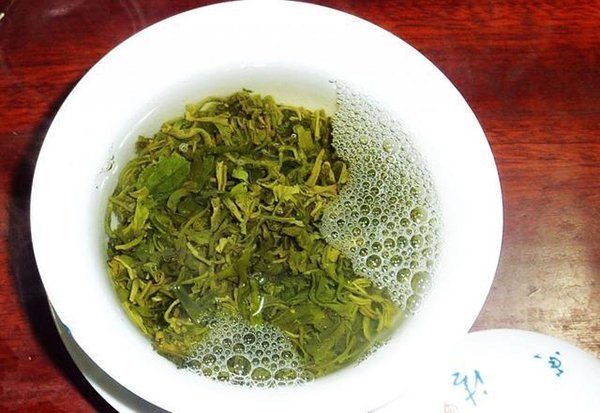Last Updated on 01/16/2021 by Desmond
When we make tea with loose leaves, we may sometimes find that the infusion will get a foam layer. Many people assume this tea foam can not be safe for drinking and remove them out. Or think some quality problems on the tea leaves and throw them all.
In fact, this tea foam is safe; and it may be great.
CONTENT
Why Does Tea Foam Develop?
4 factors lead to developing tea foam when brewing loose-leaf tea.
- There are too many broken leaves or powder;
- Low-processing white tea like Baihao Silver Needle, which retains many tiny fuzzes on the leaf, what we call “Hao;”
- The brewing methods. High water-pouring creates more foam than low-pouring;
- The leaves are rich in tea saponin;
The first three factors belong to physical phenomena, especially when you adding water too hard. And the tea saponin is the main reason for tea foam developing most of the time.

What Is Tea Saponin?
Tea saponin is a kind of excellent natural surfactant. Its water solution will continuously develop foam after shaking, and that is how the tea foam comes.
The tea saponin in Camellia Sinensis belongs to natural glycoside compounds. Its chemical construction is different in different parts of the plant, mainly distributed in root, stem, leaf, and seeds. Tea saponin tastes bitter and spicy, but the flavor is not evident due to the relatively less content. Besides, the different variety and planting regions of the Camellia Sinensis also affect the leaves’ tea saponin content.
Not only the true tea but more than 500 also various plants in the world also contain tea saponin. The most common in our life is soybean, cinnamon, and some rare Chinese traditional medicine like ginseng. So when we are making cinnamon tea or ginseng tea, we typically found more foam will be developed.

Tea Saponin Potential Benefits
Antibacterial & Antiviral
Tea saponin inhibits the fungus to prevent skin disease, and many shower gel also takes it as an ingredient. It also helps anti the virus, such as influenza A and B, measles, and even HIV.
Anti-inflammatory
At the initial stage of getting inflammation, tea saponin can refix the blood capillary to help relax the bronchospasm and edema. The effect is as awesome as any other anti-inflammatory drugs.
Alcohol Absorption Inhibition
The research found that giving alcohol to a rat 1 hour after it took tea saponin, the liver and blood alcohol content is lower than normal, then it disappears quickly. It may mean that tea saponin can improve alcohol metabolism and has a liver protection effect.
Weight Loss
Tea saponin has an effect on inhibiting pancreatic lipase. By inhibiting the pancreatic lipase activity, to reduce gut absorbs the fat from food, and lead to a weight loss purpose.
What is worth knowing, compared with the health benefits, more great effects of tea saponin are on the industrial application. As an awesome natural surfactant, tea saponin often is used in the industry like pesticide, building, and breeding. Some shampoo that takes it as an ingredient also has a hair-beauty reputedly.

Potential Side Effects
Tea saponin got a hemolysis side effect. Anyway, most of the time, the dosage in our tea will never lead to this, but it still needs to pay attention to.
Tea Foam & Tea Quality
Suppose the tea develops too much foam because of the broken leaves. In that case, that may mean something problems happened during the processing or storage. A great possibility that this tea really got a low-quality.
And to the tea saponin reason, just like we talked about before, the content is influenced by many factors; and it’s low. So it can’t reflect the quality by how much tea foam it developed when brewing.
And to the tea Hao, many white tea lovers know that it is the part with the highest value. If the tea developed much foam because of the Hao, that means it’s a high-quality tea.
Of course, no matter which reason leads to tea foam, they all got nothing bad for health; also the flavor and mouthfeel are. So when you are tangle in whether you need to remove the tea foam before drinking, just do what you want.

Reference
Effect of tea (Camellia sinensis) seed saponins on in vitro rumen fermentation, methane production and true digestibility at different forage to concentrate ratios;
Excellent information as always. Thank you.